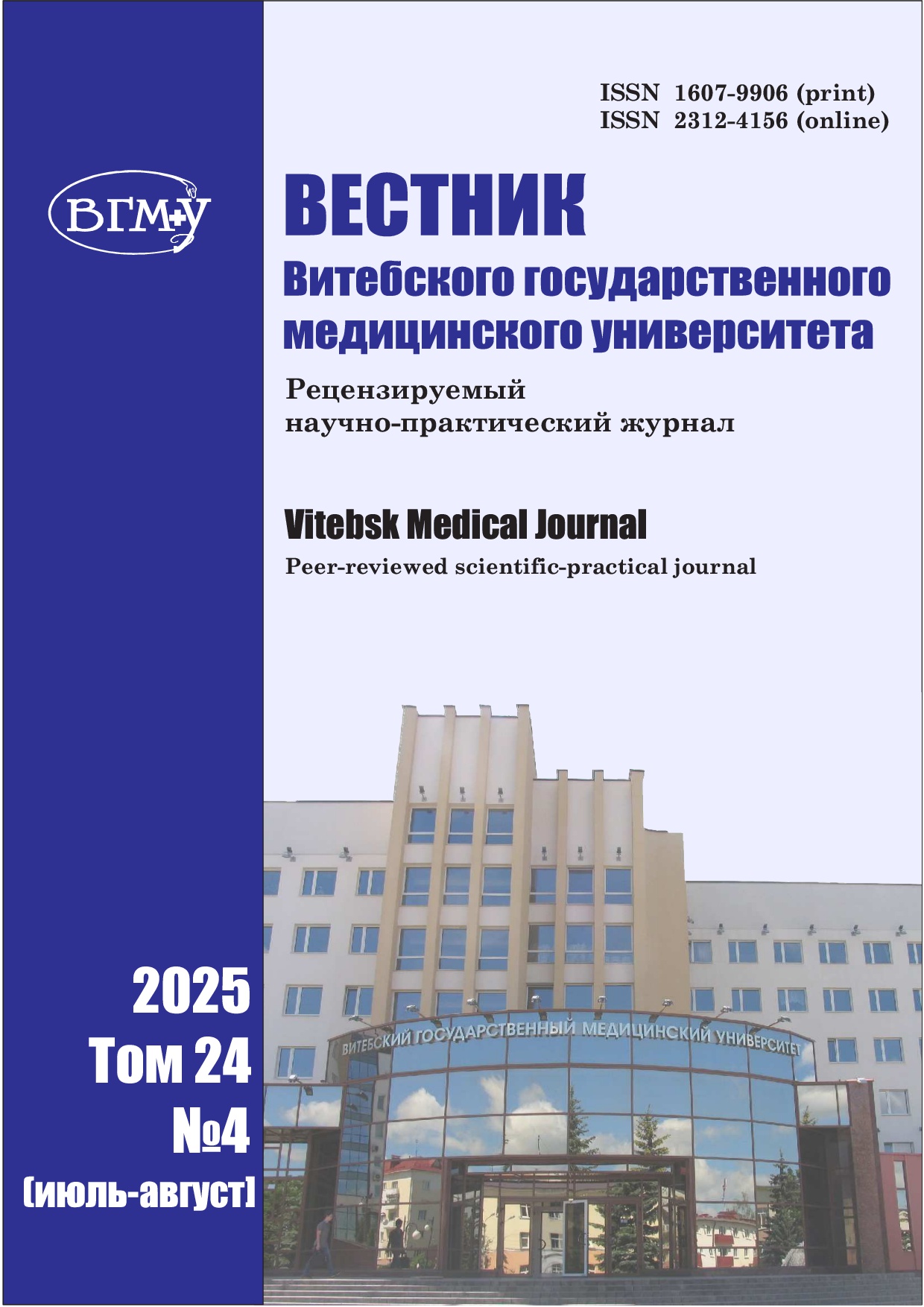Risk factors associated with unfavorable outcome in patients with severe traumatic brain injury
Abstract
Traumatic brain injury (TBI) remains one of the leading causes of mortality and disability.
Objectives. To identify key risk factors for unfavorable outcome in patients with severe TBI.
Material and methods. The prospective study was conducted in the ICU (for neurosurgical patients) of the Minsk City Clinical Emergency Hospital from 2017 to 2024 years on the impact of potential risk factors on trauma outcomes. 116 patients with severe TBI were included in it.
Results. The age of patients with the unfavorable outcome was 50,00 [37,75; 60,00] and 38,00 [34,00; 56,00] years in case of the favorable outcome (p=0,0478). The volume of transfusion for 14 days in the ICU in patients with the unfavorable outcome was 2360,00 [1082,50; 4857,50] ml versus 1120,00 [50,00; 2280,00] ml in case of the favorable outcome (p=0,0006). While proving nutritional support the protein value of ≥1.5 g protein/kg/day was in 63,6% of patients with an unfavorable outcome compared to 38,4% with a favorable outcome (p=0, 0158). 80,2% of patients (n=93) had complications and only 63,8% of patients (n=74) had multiple complications (≥2). Pneumonia was present in 69,0% cases (n=74), pulmonary embolism – in 41,4% (n=48), MOF (multiple organ failure) – in 24,1% (n=28), meningitis and sepsis – in 12,1% of cases each (n=14).
Conclusions. The risk factors were identified: the age over 40 years (RR=1,53; p=0,0099), transfusion volume >2300 ml (RR=1.43; p=0,0099), protein part of nutrition support <1.5 g protein/kg/day (RR=1,42; p=0,0158) and presence of complications (RR=39,57; p=0,0086): pneumonia (RR=11,10; p<0,0001), pulmonary embolism (RR=2,22; p<0,0001), MOF (RR=1,70; p<0,0001), meningitis and sepsis (RR=1,48; p=0,0002).
References
Epidemiological characteristics for patients with traumatic brain injury and the nomogram model for poor prognosis: an 18-year hospital-based study / S. Guo, R. Han, F. Chen [et al.] // Frontiers in neurology. 2023 May. Vol. 14. Art. 1138217. DOI:10.3389/fneur.2023.1138217
Severe Traumatic Brain Injury in a High-Income Country: An Epidemiological Study / B. Walder, G. Haller, M. M. L. Rebetez [et al.] // Journal of neurotrauma. 2013 Dec. Vol. 30, № 23. P. 1934–1942. DOI:10.1089/neu.2013.2955
Johnson, L. W. Exploring the Social Determinants of Health and Health Disparities in Traumatic Brain Injury: A Scoping Review / L. W. Johnson, I. Diaz // Brain sciences. 2023 Apr. Vol. 13, № 5. P. 707. DOI:10.3390/brainsci13050707
Incidence and mortality related risk factors in patients with severe traumatic brain injury: A meta-analysis / M. W. Liu, Z. Q. Ma, R. L. Liao [et al.] // Experimental and Therapeutic Medicine. 2025 Feb. Vol. 29, № 4. P. 1–21. DOI:10.3892/etm.2025.12834
Optimization of Nutrition after Brain Injury: Mechanistic and Therapeutic Considerations / R. A. Poblete, S. Yaceczko, R. Aliakbar [et al.] // Biomedicines. 2023 Sep. Vol. 11, № 9. P. 2551. DOI:10.3390/biomedicines11092551
Факторы риска летального исхода в остром периоде травматической болезни / Е. А. Лебедева, А. Д. Беляевский, А. А. Куртасов, З. А. Немкова // Современные проблемы науки и образования. 2012. № 4. URL: https://science-education.ru/ru/article/view?id = 6524 (дата обращения: 19.08.2025).
Outcomes and associated factors of traumatic brain injury among adult patients treated in Amhara regional state comprehensive specialized hospitals / S. G. Michael, B. Terefe, M. G. Asfaw, B. Liyew // BMC emergency medicine. 2023 Sep. Vol. 23, № 1. P. 109. DOI:10.1186/s12873-023-00859-x
Traumatic brain injury: progress and challenges in prevention, clinical care, and research / A. I. R. Maas, D. K. Menon, G. T. Manley [et al.] // The Lancet Neurology. 2022 Nov. Vol. 21, № 11. P. 1004–1060. DOI:10.1016/ S1474-4422(22)00309-X
Nutritional support for patients sustaining traumatic brain injury: a systematic review and meta-analysis of prospective studies / X. Wang, Y. Dong, X. Han [et al.] // PLoS one. 2013. Vol. 8, № 3. Art. e58838. DOI:10.1371/journal.pone.0058838
Effect of early nutrition on deaths due to severe traumatic brain injury / R. Härtl, L. M. Gerber, Q. Ni, J. Ghajar // Journal of neurosurgery. 2008 Jul. Vol. 109, № 1. P. 50–56. DOI:10.3171/JNS/2008/109/7/0050
Need for Blood Transfusion Volume Is Associated With Increased Mortality in Severe Traumatic Brain Injury / M. R. Baucom, A. D. Price, J. N. Whitrock [et al.] // The Journal of surgical research. 2024 Sep. Vol. 301. P. 163–171. DOI:1016/j.jss.2024.04.087
Об утверждении Инструкции о порядке организации оказания медицинской помощи пациентам с черепно-мозговой травмой : приказ М-ва здравоохранения Респ. Беларусь от 24 сен. 2012 г. № 1110 // ЭТАЛОН : информ.-поисковая система (дата обращения: 19.08.2025).
Парентеральное и энтеральное питание : нац. рук. / гл. ред.: С. С. Петриков, М. Ш. Хубутия, Т. С. Попова. Изд. 2-е, перераб. и доп. Москва : ГЭОТАР-Медиа, 2023. 1168 с. DOI:10.33029/9704-7277-4-PAR-2023-1-1168


